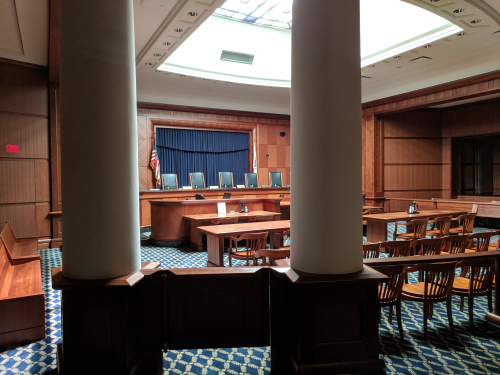A short, land-usey one today, from the Massachusetts Supreme Judicial Court. In Styller v. Zoning Board of Appeals, No. SJC-12901 (June 7, 2021), the court held that the plaintiff’s “occasional” use of a home to rent to others short-term is not a legal primary use of property in a “single residence’ zoning district.
The facts were not in dispute:
- 5,000 sf, five bedroom, single-family home, three acres of land
- “single-residence” zoning district
- owner rented premises 13 times, totaling 65 days
- rentals were between 2 and 15 days
- most were 5 days or less
- use during the rentals: reunions, board meetings, business retreats,
The town cited the owner, and the Land Court agreed that these uses were illegal “additional” uses because they constituted unauthorized use either as a boarding house or a tourist home.
The owner appealed, and the SJC took over the case. The owner argued that these uses were not unauthorized “additional uses,” but were instead permissible principal uses as a single-family detached home. In response, the town argued that the zoning code prohibits any uses not expressly permitted, and since short-term rentals are not expressly permitted, the uses are illegal.
Skip all the way down to page 15 of the slip opinion unless you want to get into the reasons why the SJC considered the case despite the landowner having sold the property during the pendency of the case (short story: the issue is really important, so we’re going to address it).
The court first agreed with the owner, and held that the owner’s use was “was not an unauthorized ‘additional’ use” (say that three times). The use did not qualify as a “lodging house” (an authorized additional use), because in lodging houses, the renters are given specific rooms, and not, as here, the entire premises. Slip op. at 16-17. And in lodging houses, the owner maintains the home as their own residence. The court also rejected the characterization of the use as a “tourist home.” Again, these things rent rooms, not the entire house. Slip op. at 19. Things looking up for the owner.
But the court ultimately made a broader ruling. It held that the uses the owner was making were illegal as a principal use in a residential zone:
The plaintiff’s argument is fundamentally flawed because it fails to recognize that short-term rental use of a one family home is inconsistent with the zoning purpose of the single-residence zoning district in which it is situated, i.e., to preserve the residential character of the neighborhood. See, e.g., Rogers v. Norfolk, 432 Mass. 374, 380 (2000) (“preservation of the residential character of neighborhoods is a legitimate municipal purpose to be achieved by local zoning control”). Indeed, courts have long recognized that municipalities may regulate in order to protect communities’ “residential character,” Euclid v. Ambler Realty Co., 272 U.S. 365, 394 (1926), and to make neighborhoods “a sanctuary for people,” Belle Terre v. Boraas, 416 U.S. 1, 9 (1974).
Slip op. at 19-20.
The court didn’t focus on the duration of the rentals (see slip op. at 4, n.6; 15 n.15), and instead looked at the character of the use. Short-term occupants don’t have that sense of community, the “stability and permanence” in a neighborhood. “Residence,” the court concluded “is commonly understood to mean ‘the place where one actually lives as distinguished from his domicile or a place of temporary sojourn.'” Slip op. at 21 (quoting Webster’s New Collegiate Dictionary 1003 (1985)).
And here’s the “buried lede” in the story that, we think, had a lot to do with the outcome:
Most frequently, the rented premises were used for family reunions, but they also were used for a college reunion, a corporate board meeting, business retreats, and “photo shoots.” Renters were given exclusive possession of the property during the applicable rental period; the Styller family stayed elsewhere. Although each rental was arranged by a single booking guest, ten of the plaintiff’s thirteen rentals had a group of six or more guests (including the booking guest).
In May 2016, a shooting incident during a weekend rental left an individual dead at the plaintiff’s property. [Cue “record scratch” sound.]
Slip op. at 4-5 (footnote omitted) (“Styller rented the premises to an individual who was part of a group of six overnight guests, purportedly for the purpose of hosting a college reunion. More than one hundred people came to the premises for the event, and one person was shot and killed.”).
Many news stories covering the shooting called the home a “mansion” or a “party house.” Not exactly the most sympathetic plaintiff to bring this issue up, we’re guessing, and this had a lot to do with the court concluding this wasn’t a “residential” use of the property (we know it when we see it).
Check it out.
Styller v. Zoning Board of Appeals, No. SJC-12901 (Mass. June 7, 2021)
